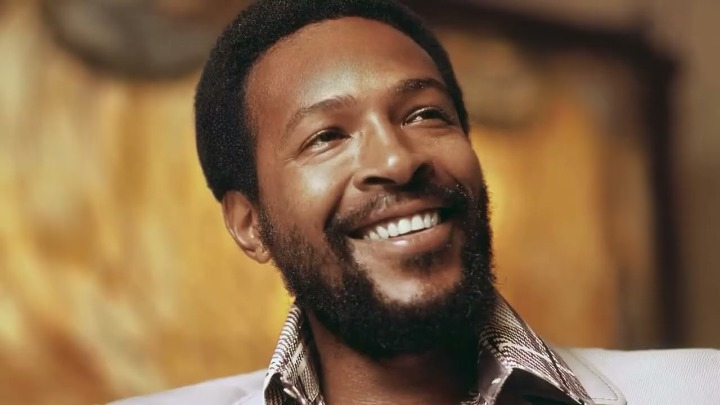When Marvin Gaye passed away on April 1, 1984, the music world lost more than a legendary voice—it lost an artist whose songs carried pain, love, and raw honesty. His death shocked fans worldwide, but what was discovered in his home afterward revealed the complexity and tragedy of a life marked by both brilliance and turmoil.
A Tragic Day in Music History
Marvin Gaye, often called the “Prince of Soul,” shaped Motown’s sound in the 1960s and 70s with his smooth vocals, gospel roots, and socially conscious lyrics. Songs like What’s Going On, Let’s Get It On, and Sexual Healing continue to resonate across generations.
Behind the fame, however, Gaye faced deep personal struggles. He battled depression, addiction, and a strained relationship with his father, Marvin Gay Sr., a strict preacher whose approval he longed for but rarely received.
By the mid-1970s, despite his global success, Marvin’s personal life was unraveling. Financial pressures and increasing drug use forced him to transfer the Los Angeles home he had bought in 1975 to his parents—a property that would later play a central role in the tragic events of 1984.
The Fatal Confrontation
On April 1, 1984, a heated argument erupted between Marvin’s parents. Marvin stepped in to protect his mother, Alberta, from his father’s anger. In the ensuing confrontation, Marvin Gay Sr. took a .38 caliber revolver—a gun previously gifted to him by Marvin—and fired. One bullet struck Marvin in the chest, proving fatal, while a second hit his shoulder. Rushed to California Hospital Medical Center, Marvin was pronounced dead at 10:01 p.m., just one day shy of his 45th birthday.
When police arrived at Marvin Gaye’s Los Angeles home, the atmosphere was heavy with grief and disbelief. Officers carefully documented the scene, which reflected the violent confrontation that had taken place. Marvin’s room, a private space of a music legend, now bore witness to his final moments.
Investigators noted signs of a struggle: overturned furniture, scattered belongings, and evidence of a desperate altercation. The weapon, a .38 caliber revolver legally owned by Marvin’s father but previously given to him by Marvin, was not immediately found at the scene.
Reports later indicated that the gun was discovered beneath a pillow on Marvin Sr.’s bed—retrieved either by Marvin’s daughter-in-law or by his mother, Alberta, who then placed it outside for police. This detail highlighted the confusion and urgency in the home in the moments following the tragic shooting.
Marvin Gaye’s room contained more than signs of a struggle—it revealed the personal struggles of a man battling inner demons. Handwritten notes, lyrics, and journals reflected his ongoing fight with depression and addiction. The toxicology report later confirmed the presence of cocaine in his system, with some sources noting traces of PCP. Combined with years of emotional strain, these findings painted a picture of a talented artist wrestling with darkness even as he brought music to millions.
Autopsy Insights
The autopsy shed light on the depth of Marvin’s struggles. Doctors confirmed that substances in his system may have influenced his mood and judgment on the day of the shooting. Those close to him knew of his depression, but the report highlighted just how severe it had become.
In the months leading up to his death, Marvin reportedly exhibited increasing paranoia, including wearing a bulletproof vest and believing he had been poisoned—claims for which he sought help from comedian Dick Gregory. His brother later recalled Marvin’s haunting last words: “I got what I wanted. I couldn’t do it myself, so I had him do it. It’s good. I ran my race. There’s no more left in me.” These words reflected exhaustion and surrender rather than sudden rage.
The evidence suggested that Marvin’s death was not simply a tragic family conflict but the result of years of inner turmoil, a life marked by genius and struggle intertwined.
A Twist in the Case: Marvin Sr.’s Tumor
Weeks after Marvin’s death, doctors discovered that his father, Marvin Gay Sr., had a benign brain tumor the size of a walnut at the base of his brain. While not cancerous, the tumor could have affected his memory, judgment, and decision-making, adding complexity to the legal case.
Prosecutors faced difficulty proving premeditated intent, and the defense argued that Marvin Sr. may not have been fully in control. After evaluations, he was declared competent to stand trial. Ultimately, on September 20, 1984, Marvin Sr. entered a plea of no contest to voluntary manslaughter, avoiding a lengthy trial while bringing a resolution to the tragic case.
On November 20, 1984, Judge Gordon Ringer issued his ruling in the case of Marvin Gaye’s death. Marvin Gay Sr. received a six-year suspended sentence, five years of probation, and a permanent ban on owning firearms or consuming alcohol. Many viewed the sentence as surprisingly lenient, but the court determined that Marvin’s death resulted not from premeditation but from a tragic escalation shaped by illness, addiction, and family tension.
The verdict sparked discussion among fans and legal experts alike. Questions arose about whether the father of a music legend should receive such a light sentence. Ultimately, the court weighed medical evidence and the emotional impact on the family, choosing compassion over strict punishment in a case defined by complex circumstances.
A World in Mourning: Marvin Gaye’s Legacy
The news of Marvin Gaye’s death sent shockwaves across the globe. Initially, some feared it was an April Fool’s prank—how could such an iconic voice be gone so suddenly? As the truth became clear, grief spread widely. Nearly 10,000 mourners attended his funeral at Forest Lawn Cemetery in California, including music legends like Smokey Robinson, Stevie Wonder, and Germaine Jackson. Marvin Gaye’s influence on soul, Motown, and popular music continues to resonate, preserving his legacy as one of the greatest voices of his generation.
